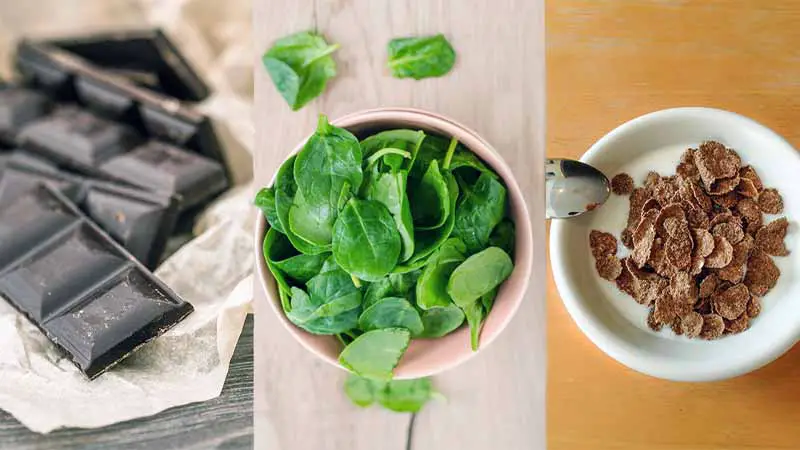The vegan and vegetarian diets they are very healthy ways of eating according to meta-analyses carried out and various studies carried out in the last 20 years. This type of diet has been linked to many health benefits and a reduced risk of obesity, heart disease or different types of cancer.
In contrast, there are several nutrients that are very difficult to get in sufficient quantities if we only follow this type of diet from vegetables. That is why it is very important to know what they are and complement the diet to keep our health at full capacity.
In this article we show you 7 nutrients that are usually missing in vegan diets.
Table of Contents
Assimilable iron
Heme iron or assimilable iron is a form of iron that can be found only in meat, especially in red meat. Its absorption rate is much higher than non-heme iron, which we usually find in vegetables.
Read more: foods with more iron.
Another advantage is that iron of animal origin improves the absorption rate of non-heme iron present in plant foods. Iron from vegetables is poorly absorbed, and in addition its assimilation can be even more affected if it is combined with nutrients present in plants, such as phytic acid, the opposite of iron of animal origin.
Therefore, it is common for vegetarians or vegans to suffer from anemia, since raw foods do not provide the required amount, especially pregnant women.

For this reason, vegetarians and vegans, especially women and people on raw food diets, are more prone to anemia than meat eaters.
Vitamin B12
The vitamin B12 is an essential element that we find almost exclusively in products of animal origin such as meat, fish, dairy products or eggs
This vitamin is also known as cobalamin, and is considered a water-soluble element involved in the formation of red blood cells and the proper functioning of brain activity.
Several scientific studies have been able to show that a diet without this type of food mentioned has a high risk of suffering from vitamin B12 deficiency. [Additional Information]
This vitamin can be obtained in vegetarian diets where dairy products or eggs are consumed, but it is not the case for those people who only base their diet on vegetables.
Symptoms and risks related to a lack of vitamin B12 include the following:
- Fatigue and muscle weakness.
- Reduced brain activity.
- Neurological damage
- Megaloblastic anemia
To get sufficient amounts of vitamin B12, people who follow a vegan diet should take supplements or eat foods that have been fortified with this nutrient.
If you want to give a try to vegetarian foods that contain bioactive vitamin B12, they are the following:
- Alga nori
- Tempeh
- Shiitake mushrooms

Vitamin D3 (cholecalciferol)
Vitamin D is an essential component with great functionality in our body. Most of it we get from the Sun, although we also find some foods that contain it.
Our skin is able to manufacture vitamin D when we are exposed to sunlight. However, if we live in very cloudy countries or areas we probably need supplementation or a higher consumption of foods rich in this vitamin.
We found two types of vitamin D:
- Vitamin D2 (ergocalciferol): source in different plants.
- Vitamin D3 (cholecalciferol): source of animal origin.
Of these 2, cholecalciferol (vitamin D3) increases blood levels of assimilable vitamin D more efficiently than vitamin D2. [See investigations]
The main sources of vitamin D3 are fatty fish and yemegg ace. We can also find this element in cod liver oil or milk and cereals. However, the main sources of vitamin D3 are not of vegetable origin, so if we take this type of diet added to living in an area with low exposure to the Sun, we will need supplementation.
Read more: top foods with more vitamin D.
Creatine
Creatine is a nutrient that can be found in some foods from animals. Most creatine is stored in the muscles, but there are also significant amounts in our brain.
Its function is to be an ener reservegía easily available to cells, offering them greater strength and resistance [Additional Information].
That is why it is one of the most common supplements for athletes, as it directly influences muscle mass and strength.
However, this element is not essential in our diet, as our liver has the ability to produce the amounts we need. However, the vegan diet causes the liver to produce noticeably lower amounts of creatine. [See information]
Since creatine can only be found naturally in the carnivorous diet, vegetarians and vegans can only get it through the use of nutritional supplements.
Carnosine
Carnosine is an antioxidant compound found in muscles and also in the brain. It is very important to cover muscle function, and high levels of carnosine in muscles are linked to a reduction in muscle fatigue and increased performance, according to scientific research. [View Report]
On the other hand, carnosine is another component that is only found in foods of animal origin (especially in chicken and fish). However, like creatine, it is considered non-essential and our body can manufacture it from (amino acids histidine and beta-alanine).
In general, those who follow vegetarian diets have a lower concentration of carnosine in their bodies. [See study]
Taurine
Taurine is a sulfur-rich compound that is located in various parts of the body, among the main ones the brain, heart and kidneys.
Its function in our body is not known for sure, but it seems to play an important role in muscle activity, formation of bile salts and the activity of antioxidant substances.
Taurine is found only in foods of animal origin: fish, seafood, meat, poultry and dairy. Some studies have already been able to show that vegans have a lower concentration of taurine than carnivores.
Docosahexaenoic acid (DHA)
It is known as DHA and is a omega-3 fatty acid essential vital for the functionality of the brain. [Source of information]
Dha deficiency may have negative effects on mental health and brain activity, especially in young children. On the other hand, taking less DHA than adequate, especially in pregnant women, can negatively affect the development of the unborn child’s brain.
The main sources of DHA are found in fatty fish, fish oil and certain types of microalgae. In addition, our body has the ability to manufacture DHA from the omega-3 fatty acid ALA, which we can find in sufficient quantity in flax seeds, chia seeds and walnuts.
This conversion process is not as effective as we might expect, so not eating fish can contribute to its low presence in our body.
Bibliography consulted
- Guesnet P, Alessandri JM. Docosahexaenoic acid (DHA) and the developing central nervous system (CNS) – Implications for dietary recommendations. Biochimie. 2011 Jan;93(1):7-12. doi: 10.1016/j.biochi.2010.05.005. Epub 2010 May 15. PMID: 20478353.
- Everaert I, Mooyaart A, Baguet A, Zutinic A, Baelde H, Achten E, Taes Y, De Heer E, Derave W. Vegetarianism, female gender and increasing age, but not CNDP1 genotype, are associated with reduced muscle carnosine levels in humans. Amino Acids. 2011 Apr;40(4):1221-9. doi: 10.1007/s00726-010-0749-2. Epub 2010 Sep 24. PMID: 20865290.
- Derave W, Ozdemir MS, Harris RC, Pottier A, Reyngoudt H, Koppo K, Wise JA, Achten E. beta-Alanine supplementation augments muscle carnosine content and attenuates fatigue during repeated isokinetic contraction bouts in trained sprinters. J Appl Physiol (1985). 2007 Nov;103(5):1736-43. doi: 10.1152/japplphysiol.00397.2007. Epub 2007 Aug 9. PMID: 17690198.
- Burke DG, Chilibeck PD, Parise G, Candow DG, Mahoney D, Tarnopolsky M. Effect of creatine and weight training on muscle creatine and performance in vegetarians. Med Sci Sports Exerc. 2003 Nov;35(11):1946-55. doi: 10.1249/01.MSS.0000093614.17517.79. PMID: 14600563.
- GARCIA-MALDONADO, Elena; GALLEGO-NARBON, Angélica and VAQUERO, Mª Pilar. Are vegetarian diets nutritionally adequate? A review of the scientific evidence. Nutr. Hosp. [online]. 2019, vol.36, n.4 [citado 2021-12-30], pp.950-961.
